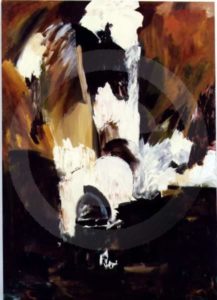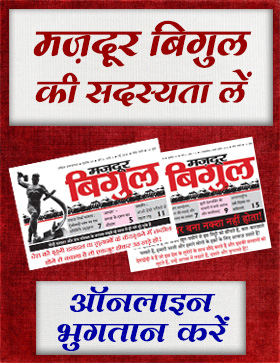Table of Contents
कहानी – ला सियोतात का सिपाही
बर्टोल्ट ब्रेष्ट, अनुवाद: सत्यम
For English version of this story, please scroll down
पहले विश्व युद्ध के बाद, दक्षिणी फ्रांस के छोटे-से बन्दरगाह वाले शहर ला सियोतात में एक जहाज़ को पानी में उतारे जाने के जश्न के दौरान, हमने चौक में एक फ्रांसीसी सिपाही की काँसे की प्रतिमा देखी जिसके इर्दगिर्द भीड़ जमा थी। हम नज़दीक गये तो देखा कि वह एक जीवित व्यक्ति था। वह धूसर रंग का ग्रेटकोट पहने था, सिर पर टिन का टोप था, और जून की गर्म धूप में वह संगीन ताने चबूतरे पर बिल्कुल स्थिर खड़ा था। उसकी एक भी पेशी हिलडुल नहीं रही थी, पलकें तक नहीं फड़क रही थीं।
उसके पैरों के पास चबूतरे से टिकाकर रखे कार्डबोर्ड के टुकड़े पर ये शब्द लिखे हुए थे:
मानव प्रतिमा
मैं, चार्ल्स लुई फ्रांशार, …रेजिमेंट में सिपाही, वेर्दून में ज़िन्दा दफ़्न कर दिये जाने की बदौलत मुझमें मनचाहे समय तक मूर्ति की तरह अविचल रहने की असामान्य क्षमता आ गयी है। मेरे इस कौशल की अनेक प्रोफ़ेसरों ने जाँच की है और इसे एक ऐसी बीमारी बताया है जिसका कोई कारण समझ नहीं आता। कृपया एक परिवार के बेरोज़गार पिता के लिए सहायता करें।
हमने तख्ती के पास रखी तश्तरी में एक सिक्का डाल दिया और सिर हिलाते हुए वहाँ से चल दिये।
 हम सोच रहे थे, तो यहाँ खड़ा है वह, सिर से पाँव तक हथियारों से लैस, इस लम्बी सहस्राब्दी का अविनाशी सैनिक, जिसके सहारे इतिहास का निर्माण हुआ, जिसके दम पर सिकन्दर, सीज़र और नेपोलियन ने वे महान कार्य किये जिनके बारे में हम स्कूली किताबों में पढ़ते हैं। ये रहा वह। एक पलक भी नहीं फड़काता। यही है साइरस का तीरन्दाज़, कैम्बाइस का कटारयुक्त पहियों वाले रथ पर सवार सैनिक जिसे रेगिस्तान की रेत भी हमेशा के लिए दफ़्न नहीं कर सकी, सीज़र का लीजनरी, चंगेज़ ख़ान का भालाधारी घुड़सवार, लुई चौदहवें का स्विस गार्ड, नेपोलियन का ग्रेनेडियर। उसके पास है वह क्षमता—जो इतनी असामान्य भी नहीं—कि उस वक़्त भी भावनाओं में न बहे जब विनाश के हर तरह के औज़ार उस पर आज़माये जाते हों। वह पत्थर की तरह अविचल रहता है (उसका कहना है), बिना कुछ महसूस किये, जब उसे भेजा जाता है मरने के लिए। हर युग के—प्रस्तर, कांस्य, लौह—भालों से छलनी किया जाता है, आर्तज़रज़ीस और सेनापति लुडेनड्रॉफ़ के लड़ाकू रथों के चक्कों से कुचला जाता है, हन्नीबाल के हाथियों और अटीला के घुड़सवारों के पैरों तले रौंदा जाता है, तमाम शताब्दियों की लगातार सुधर रही तोपों से उड़ती धातु से और उससे पहले विशाल गुलेलों से उड़ते पत्थरों से टुकड़े-टुकड़े हो जाता है, कबूतर के अंडों जैसी बड़ी, मधुमक्खी जैसी छोटी रायफ़ल की गोलियाँ उसे छेद डालती हैं, पर वह वैसे ही खड़ा रहता है। अलग-अलग ज़ुबानों में बार-बार नये आदेशों पर अमल करता हुआ, मगर कभी नहीं जानता कि क्यों और किसलिए। जो इलाक़े उसने जीते उन पर उसका अधिकार नहीं हुआ, वैसे ही जैसे राजमिस्त्री उस घर में नहीं रहता जो उसने बनाया है। जिस भूमि की उसने रक्षा की वह भी उसकी नहीं है। अपने हथियारों और उपकरणों का भी वह मालिक नहीं है। लेकिन वह खड़ा है विमानों से बरसती मौत और नगर के परकोटों से बरसते शोलों के नीचे, उसके पैरों तले हैं बारूदी सुरंगें और गहरी खाइयाँ, उसके चारों ओर है बीमारी और मस्टर्ड गैस, पर वह खड़ा है, भाले और तीर का जीता-जागता निशाना, तोपों का चारा, टैंक के नीचे पिसी लुगदी, गैसों को पीने वाला। उसके सामने है दुश्मन और पीछे है जनरल।
हम सोच रहे थे, तो यहाँ खड़ा है वह, सिर से पाँव तक हथियारों से लैस, इस लम्बी सहस्राब्दी का अविनाशी सैनिक, जिसके सहारे इतिहास का निर्माण हुआ, जिसके दम पर सिकन्दर, सीज़र और नेपोलियन ने वे महान कार्य किये जिनके बारे में हम स्कूली किताबों में पढ़ते हैं। ये रहा वह। एक पलक भी नहीं फड़काता। यही है साइरस का तीरन्दाज़, कैम्बाइस का कटारयुक्त पहियों वाले रथ पर सवार सैनिक जिसे रेगिस्तान की रेत भी हमेशा के लिए दफ़्न नहीं कर सकी, सीज़र का लीजनरी, चंगेज़ ख़ान का भालाधारी घुड़सवार, लुई चौदहवें का स्विस गार्ड, नेपोलियन का ग्रेनेडियर। उसके पास है वह क्षमता—जो इतनी असामान्य भी नहीं—कि उस वक़्त भी भावनाओं में न बहे जब विनाश के हर तरह के औज़ार उस पर आज़माये जाते हों। वह पत्थर की तरह अविचल रहता है (उसका कहना है), बिना कुछ महसूस किये, जब उसे भेजा जाता है मरने के लिए। हर युग के—प्रस्तर, कांस्य, लौह—भालों से छलनी किया जाता है, आर्तज़रज़ीस और सेनापति लुडेनड्रॉफ़ के लड़ाकू रथों के चक्कों से कुचला जाता है, हन्नीबाल के हाथियों और अटीला के घुड़सवारों के पैरों तले रौंदा जाता है, तमाम शताब्दियों की लगातार सुधर रही तोपों से उड़ती धातु से और उससे पहले विशाल गुलेलों से उड़ते पत्थरों से टुकड़े-टुकड़े हो जाता है, कबूतर के अंडों जैसी बड़ी, मधुमक्खी जैसी छोटी रायफ़ल की गोलियाँ उसे छेद डालती हैं, पर वह वैसे ही खड़ा रहता है। अलग-अलग ज़ुबानों में बार-बार नये आदेशों पर अमल करता हुआ, मगर कभी नहीं जानता कि क्यों और किसलिए। जो इलाक़े उसने जीते उन पर उसका अधिकार नहीं हुआ, वैसे ही जैसे राजमिस्त्री उस घर में नहीं रहता जो उसने बनाया है। जिस भूमि की उसने रक्षा की वह भी उसकी नहीं है। अपने हथियारों और उपकरणों का भी वह मालिक नहीं है। लेकिन वह खड़ा है विमानों से बरसती मौत और नगर के परकोटों से बरसते शोलों के नीचे, उसके पैरों तले हैं बारूदी सुरंगें और गहरी खाइयाँ, उसके चारों ओर है बीमारी और मस्टर्ड गैस, पर वह खड़ा है, भाले और तीर का जीता-जागता निशाना, तोपों का चारा, टैंक के नीचे पिसी लुगदी, गैसों को पीने वाला। उसके सामने है दुश्मन और पीछे है जनरल।
वे अनकहे हाथ जिन्होंने उसकी वर्दी तैयार की, जिरहबख्तर गढ़े, जूते सिले! वे अनकही जेबें जो उसने भरीं! दुनिया की हर भाषा में वह भीषण कोलाहल जो उसे आगे धकेलता रहा! कोई देवता नहीं जिसने उसे आशीर्वाद न दिया हो। वह, जो धैर्य के घृणित कोढ़ से पीड़ित है, हर बात से अप्रभावित रहने के असाध्य रोग ने जिसकी शक्ति हर ली है।
हमने सोचा, यह किस तरह का ज़िन्दा दफ़नाना है, जिसने उसे यह डरावना, वीभत्स, बेहद संक्रामकरोग लगा दिया है?
हमने ख़ुद से पूछा, क्या कभी इसका इलाज नहीं हो सकेगा?
Story – The Soldier of La Ciotat
Bertolt Brecht
After the first world war in the public square of the little harbour town of La Ciotat in the south of France during a fair celebrating a ship launch we saw a bronze sculpture of a French soldier. Around him a crowd was milling. We drew closer and discovered that it was in fact a living person standing there on a sandstone plinth in the hot June sun, motionless in an earth-brown coat, helmet on head, bayonet in hand. His face and hands were covered in bronze paint. He moved not a muscle, not even an eyelid.
At his feet leaned a piece of cardboard on which was written the following text:
The Statue Man
I, Charles Louis Franchard, soldier of the … regiment, as a result of being buried alive at Verdun, gained the unusual capability of remaining completely immovable and behaving like a statue for as long as I like. This capability of mine has been verified by many professors and diagnosed as an inexplicable illness. Please give freely to an unemployed father with a family.
We threw a coin in the plate next to the sign and, shaking our heads, moved on.
So here he stands, we thought, armed to the teeth, the indestructible soldier of the millennia, he with whom history was made, he who made possible all those great deeds of the Alexanders, Caesars, Napoleons that we read about in the school textbooks. It’s him. He doesn’t bat an eyelid. He is the bowman of Cyrus, the chariot driver of Cambyses whom the desert sands could not bury for ever, Caesar’s legionnaire, Genghis Khan’s lancer, Louis the 14th’s Swiss Guard and Napoleon’s grenadier. He possesses the actually not uncommon capability of remaining stony-faced when all kinds of weapons of destruction are tried out upon him. Without feeling, like a rock he remains (he says) when he is sent to his death.
Spiked by the lances of the most various ages, stone-like, bronze-like, iron-like, run over by the vehicles of war, those of Xerxes and General Ludendorff, smashed by Hannibal’s elephants and Attila’s mounted hordes, ripped apart by the flying iron of several centuries’ ever more perfect guns but also the flying stones from catapults, torn apart by rifle bullets big as doves’ eggs and small as bees, there he stands, indestructible, always and again and again, ordered about in many languages but always ignorant of the why and the wherefore.
The lands he conquered he did not take in possession, just as the builder does not live in the house he has built. Nor did the land he defended belong to him. Not even his weapon or his gear belong to him. Yet there he stands, above him the deadly rain of the aeroplanes and the burning tar of the city walls, below him the mine and the hidden trap, around him the plague and the mustard gas, fleshly bait for arrow and spear, target, squashed tank goo, gas cooker, in front of him the enemy and behind him the general!
Untold the numbers of hands that wove his woollens, hammered his armour, cut his boots! Untold the numbers of coffers that were filled on account of him! Immeasurable the cheers in all the world’s languages that spurred him on. No God that didn’t bless him! Him, the man burdened with the terrible plague of patience, hollowed out by the incurable illness of unfeelingness!
What a truly live burial, we thought, is that which has occasioned this illness, this terrible, monstrous, so exceedingly contagious illness? ‒ Yet could it not, we asked ourselves, be curable after all?
‘मज़दूर बिगुल’ की सदस्यता लें!
वार्षिक सदस्यता - 125 रुपये
पाँच वर्ष की सदस्यता - 625 रुपये
आजीवन सदस्यता - 3000 रुपये
आर्थिक सहयोग भी करें!
 बुर्जुआ अख़बार पूँजी की विशाल राशियों के दम पर चलते हैं। मज़दूरों के अख़बार ख़ुद मज़दूरों द्वारा इकट्ठा किये गये पैसे से चलते हैं।
बुर्जुआ अख़बार पूँजी की विशाल राशियों के दम पर चलते हैं। मज़दूरों के अख़बार ख़ुद मज़दूरों द्वारा इकट्ठा किये गये पैसे से चलते हैं।
मज़दूरों के महान नेता लेनिन









